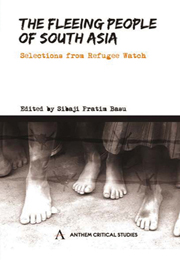Book contents
- Frontmatter
- Contents
- Acronyms and Abbreviations
- Foreword by Ranabir Samaddar
- Preface
- ETHICAL ISSUES
- LAWS
- SOUTH ASIA
- INDIA
- GENDER
- INTERVIEW/CORRESPONDENCE
- REPRESENTATIONS
- Introduction
- Creativity's Mirror
- Writing Displacement: Creativity and Objectivity
- Boundaries, Borders and Bodies
- Forced Displacement and Identity Formation in the EU
- The Changing Scales of Good and Evil: Morality Plays at the Profiled EU and US Borders
- Index
Boundaries, Borders and Bodies
from REPRESENTATIONS
Published online by Cambridge University Press: 05 March 2012
- Frontmatter
- Contents
- Acronyms and Abbreviations
- Foreword by Ranabir Samaddar
- Preface
- ETHICAL ISSUES
- LAWS
- SOUTH ASIA
- INDIA
- GENDER
- INTERVIEW/CORRESPONDENCE
- REPRESENTATIONS
- Introduction
- Creativity's Mirror
- Writing Displacement: Creativity and Objectivity
- Boundaries, Borders and Bodies
- Forced Displacement and Identity Formation in the EU
- The Changing Scales of Good and Evil: Morality Plays at the Profiled EU and US Borders
- Index
Summary
[…] I was asked to speak on ‘forced migration and trafficking’ terms, which have now become major international law concerns. Recent debates in international agencies have sensationalized migration by linking it to trafficking in arms and drug smuggling and terrorism, to AIDS/HIV. The migrant, whose labour has served to build the wealth of other countries, has been reduced to a carrier of crimes and disease.
The use of the word ‘forced’ is, of course, susceptible to many complex nuances of interpretation that serve different interests or reflect different perspectives. It is indeed a contentious issue between countries of origin and destination, and government responses have been both contradictory and hypocritical. While countries of origin welcome foreign remittances from workers, they do little to facilitate their terms and conditions of employment. […] The more powerful countries such as the US have gone to the extent of using trade sanctions against the country of origin. At the same time the US has tempted migration through the sale of lotteries.
On the other hand, for ordinary citizens, freedom of movement is a choice for survival. Migration can be forced by political and economic circumstances in the country of origin, but administrative controls in the country of destination also force migrants into exploitative relations. […] While migration may be seen as a strategy for survival by families or an escape route for individuals, or even as presenting new opportunities, the human rights of migrants and their security are at risk from state controls, exploitation of the market and social exclusion. […]
- Type
- Chapter
- Information
- The Fleeing People of South AsiaSelections from Refugee Watch, pp. 413 - 423Publisher: Anthem PressPrint publication year: 2009

